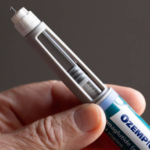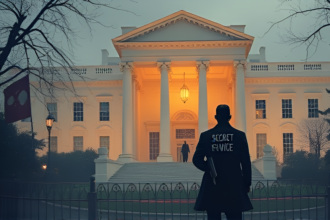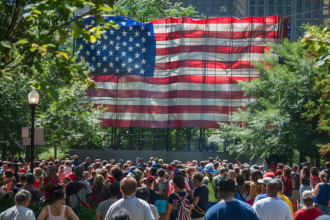Once a celebration of hope for closer ties, Trump’s presidency left Russia disillusioned. Expectations remain cautious as a second bid looms, and relations are colder than ever.
- Did Russia Toast Too Soon to Trump?
- What Happened to Russia's Hopes for Trump?
- Are Russians More Cautious About a Second Trump Term?
- How Do Trump and Harris Compare on Russia Policy?
- Did Relations Under Biden Fall Apart Completely?
- What Do Bronze Ducks Have to Do with Diplomacy?
- What Do Russians Think About America Today?
- Could Russia Ever Have a Woman President?
Did Russia Toast Too Soon to Trump?
In November 2016, Russian ultranationalist politician Vladimir Zhirinovsky was so overjoyed by Donald Trump’s unexpected victory that he splurged on 132 bottles of champagne in Russia’s parliament, the Duma. Convinced that Trump’s win would revolutionize US-Russian relations, Zhirinovsky partied in his office, with TV cameras capturing the moment of jubilation. He wasn’t alone in his excitement.
Margarita Simonyan, the editor-in-chief of state-run RT, tweeted her celebratory plan: to drive around Moscow with an American flag in her car window. Even Russian officials joined in. One memorable moment came when a high-ranking official said she had smoked a cigar and downed a bottle of champagne to toast Trump’s win. For Russia, hopes were high that Trump’s presidency would bring about significant change—chief among them was the lifting of sanctions and possibly even US recognition of Crimea as part of Russia.
What Happened to Russia's Hopes for Trump?
Russia was on the cusp of a breakthrough in US relations then. “The value of Trump was that he never preached on human rights in Russia,” Konstantin Remchukov, owner and editor-in-chief of Nezavisimaya Gazeta, remarked, summing up the Kremlin’s initial optimism.
However, the bubble burst only briefly. “Trump introduced the heaviest sanctions against Russia at that time,” Remchukov recalled, reflecting on his disappointment. “By the end of his term, many people were disappointed in his presidency.”
What had started with jubilation quickly turned to disillusionment. Despite the fanfare and the hope for better relations, Trump’s presidency failed to live up to Russian expectations. The promise of a warmer diplomatic relationship fizzled, and the champagne buzz wore off.
Are Russians More Cautious About a Second Trump Term?
Fast forward to 2024, and Russia’s approach to a possible second Trump term is far more measured. Russian officials, once vocal in their support for Trump, have now taken a more cautious stance. Even President Vladimir Putin, known for his carefully calculated political moves, has surprised some by voicing a preference for the Democratic candidate, Kamala Harris—albeit with a wink and a nudge, as many believe his “endorsement” to be nothing more than Kremlin trolling. Putin even went so far as to praise Harris’s “infectious” laugh.
But while Putin may be playing diplomatic games in public, behind closed doors, Trump has given Russian officials more to smile about. On the campaign trail, Trump has made comments that resonate with the Kremlin. His criticisms of the extensive US military support for Ukraine, his reluctance to hold Putin accountable for the full-scale invasion, and his refusal during a presidential debate to say whether he wanted Ukraine to win the war are all music to Russian ears.
How Do Trump and Harris Compare on Russia Policy?
Kamala Harris, on the other hand, has been firm in her stance against Russia, calling support for Ukraine a matter of “strategic interest” for the United States. She has also referred to Putin as a “murderous dictator,” which hasn’t endeared her to Russian state media. One of Russia’s most prominent news anchors recently mocked Harris, suggesting she would be better suited to hosting a TV cookery show than holding political office.
Despite this, the Kremlin may not place all its hopes on a Trump victory. Another outcome that could benefit Russia is a closely contested election followed by political chaos in the US. “An America consumed by post-election chaos, confusion, and confrontation would have less time to focus on foreign affairs, including the war in Ukraine,” a Russian analyst suggested.
Did Relations Under Biden Fall Apart Completely?
US-Russian relations have been on a downward spiral for years. Under Barack Obama, tensions between Washington and Moscow escalated, worsened under Donald Trump, and deteriorated even further under Joe Biden. In the words of Russia’s recently departed ambassador to Washington, Anatoly Antonov, relations are “falling apart” under the current administration.
Eight months after Biden and Putin met in Geneva for a much-anticipated summit, the Kremlin launched a full-scale invasion of Ukraine. Since then, the Biden administration has led a coordinated Western effort to impose sanctions on Russia. Meanwhile, the United States has provided Ukraine with crucial military aid, including advanced weaponry like Abrams tanks and HIMARS rocket systems, helping Kyiv hold off Russian forces for over two and a half years.
Not long ago, the idea of Russia and the US working together to ensure global security was within reach. The late 1980s saw US President Ronald Reagan and Soviet leader Mikhail Gorbachev form a strategic partnership significantly reducing their nuclear arsenals. Reagan, who famously enjoyed reciting Russian proverbs to Gorbachev in broken Russian, might have appreciated one fitting for the current situation: “Never buy 132 bottles of champagne unless you’re certain it’s worth celebrating.”
What Do Bronze Ducks Have to Do with Diplomacy?
The cooling relations between the US and Russia seem far removed from the symbolism of the early 1990s when there was still hope for friendship. In 1991, Raisa Gorbacheva and Barbara Bush, the First Ladies of the USSR and the United States, unveiled a sculpture of a mother duck with her ducklings in Moscow. This statue, a replica of one in Boston Public Gardens, was a gesture of goodwill meant to symbolize friendship between Soviet and American children.
To this day, Muscovites still flock to Novodevichy Park to pose with the bronze ducks, though few remember the story of “duck diplomacy” behind the sculpture. Like the ducks, the US-Russian relationship has taken a few knocks. On one occasion, the ducklings were stolen and had to be replaced—just as the optimism of Russian-American friendship has been replaced by suspicion and discord.
What Do Russians Think About America Today?
I headed to Novodevichy Park to gauge public opinion and ask Russians what they think about America and the upcoming US election. Igor, an angler fishing in a nearby pond, expressed anger toward the US. “I want America to disappear,” he said, reeling in his line. “It has started so many wars in the world. The US was our enemy in Soviet times, and it still is. It doesn’t matter who’s president.”
Igor’s views reflect the sentiments often echoed in Russian state media, where the narrative of America as an eternal enemy persists. But is his anger driven by the news he consumes or his bad luck with the fish?
Not everyone shares Igor’s hostility. “I’m all for peace and friendship,” said Svetlana, who seemed uncertain about where the absolute lack of freedom lies. “But my friend in America is scared to call me now. Maybe there’s no free speech there. Or, perhaps, it’s here in Russia that there’s no freedom of speech. I don’t know.”
Nikita, another park goer, also saw things differently. “Our countries and two peoples should be friends,” he said. “Without wars and without competing to see who has more missiles. I prefer Trump. When he was president, there weren’t any big wars.”
Could Russia Ever Have a Woman President?
Despite the stark differences in Russian and American leadership, both countries share one notable similarity: they’ve always been led by men. Could that change? “I think it would be great if a woman became president,” said Marina, a resident. “I would happily vote for a woman president here [in Russia]. I’m not saying it would be better or worse. But it would be different.”
For now, though, as the world watches the US 2024 election unfold, Russia’s cautious optimism remains tempered by memories of past disappointments. Whether Trump wins or not, one thing is clear—the champagne bottles will stay corked for now.
The Keystone State and Pennsylvania’s Pivotal Role in the 2024 Presidential Election







